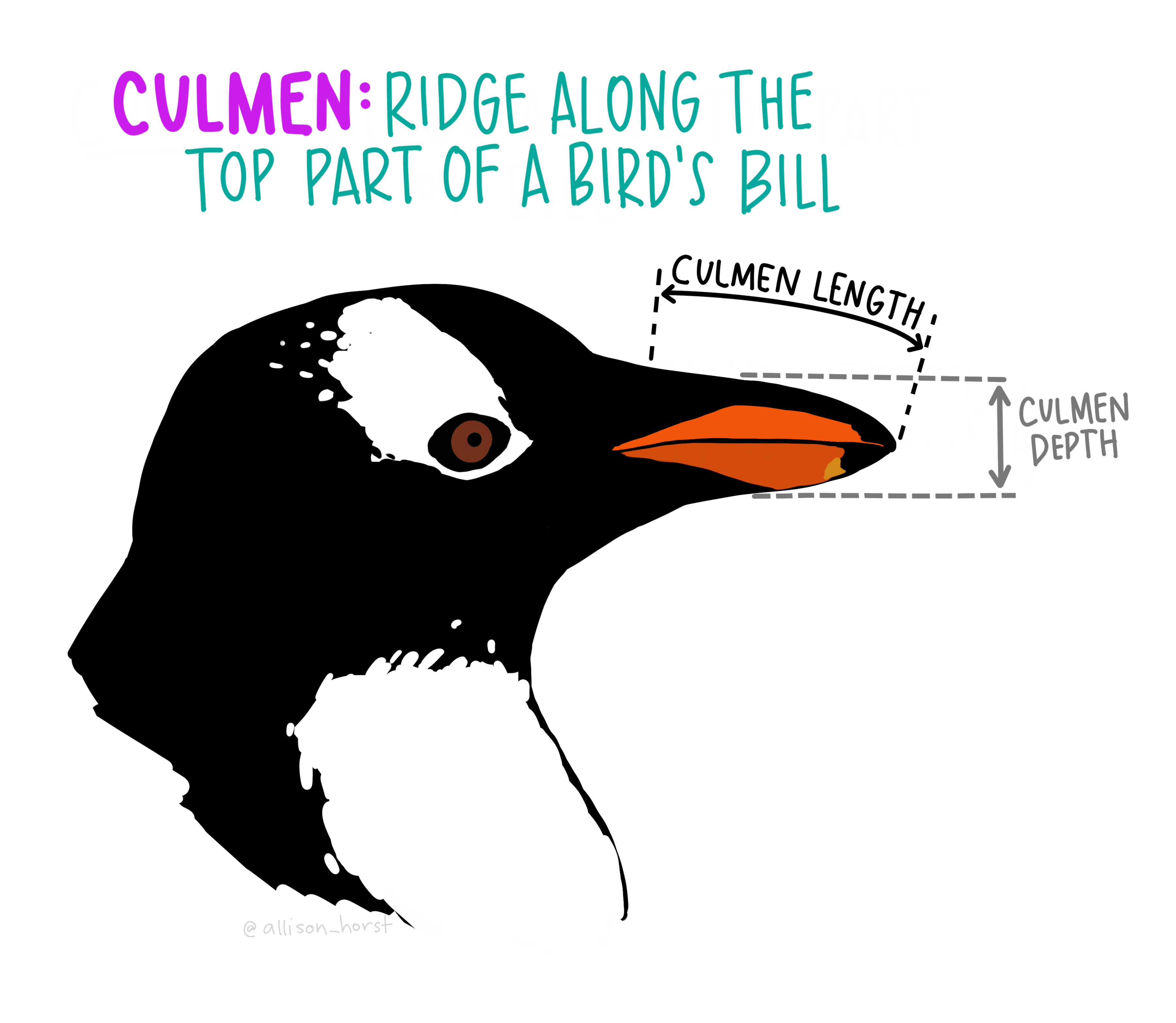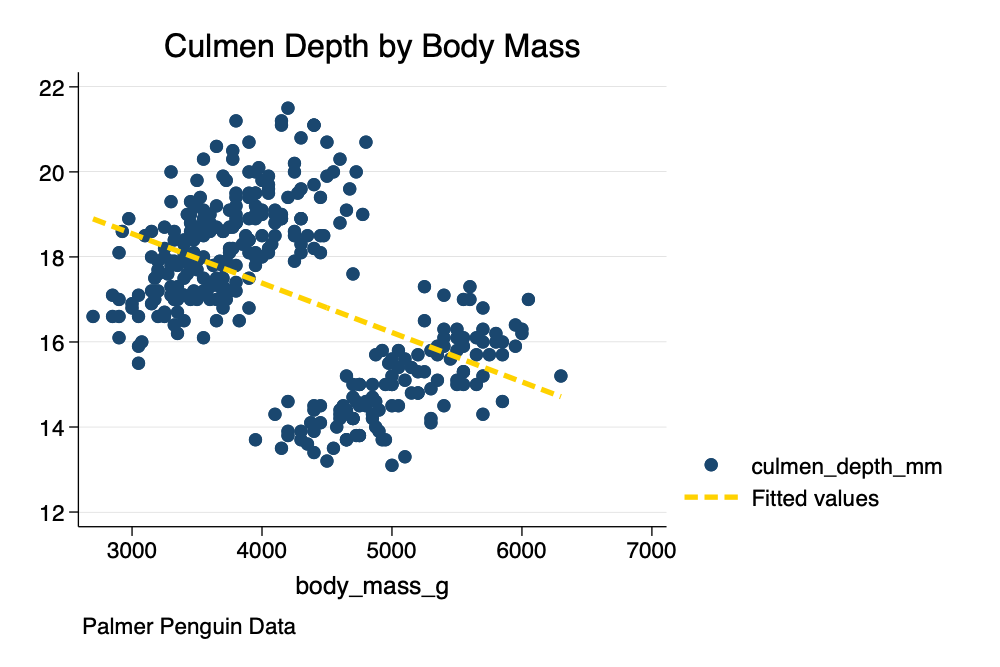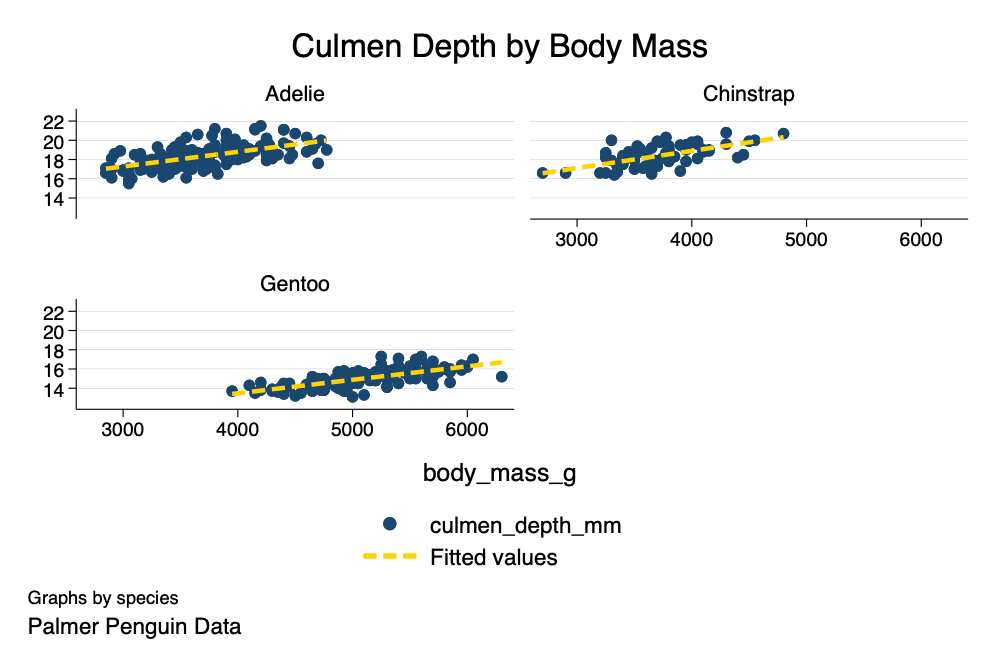
2 Feb 2022 11:46:25
Simpson’s paradox occurs when a bivariate association is reversed in a multivariate model. This example using the Palmer Penguins Data was inspired by a tweet by Andrew Heiss.

To begin, a little definition of penguin terminology is in order. Note the diagram defining culmen depth below.

. clear all
. use "penguins.dta"
. twoway (scatter culmen_depth_mm body_mass_g) ///
> (lfit culmen_depth_mm body_mass_g), ///
> title("Culmen Depth by Body Mass") ///
> caption("Palmer Penguin Data") ///
> scheme(michigan)
. graph export mygraph1.png, width(1000) replace
file /Users/agrogan/Desktop/GitHub/teaching/simpsons-paradox-palmer-penguins/mygraph1.png saved
as PNG format

. regress culmen_depth_mm body_mass_g
Source │ SS df MS Number of obs = 342
─────────────┼────────────────────────────────── F(1, 340) = 97.41
Model │ 296.15994 1 296.15994 Prob > F = 0.0000
Residual │ 1033.67459 340 3.04021939 R-squared = 0.2227
─────────────┼────────────────────────────────── Adj R-squared = 0.2204
Total │ 1329.83453 341 3.89980801 Root MSE = 1.7436
─────────────┬────────────────────────────────────────────────────────────────
culmen_dep~m │ Coefficient Std. err. t P>|t| [95% conf. interval]
─────────────┼────────────────────────────────────────────────────────────────
body_mass_g │ -.0011621 .0001177 -9.87 0.000 -.0013937 -.0009305
_cons │ 22.03395 .5036206 43.75 0.000 21.04334 23.02455
─────────────┴────────────────────────────────────────────────────────────────
. est store M1
. twoway (scatter culmen_depth_mm body_mass_g) ///
> (lfit culmen_depth_mm body_mass_g), ///
> by(species, title("Culmen Depth by Body Mass") caption("Palmer Penguin Data")) ///
> scheme(michigan)
. graph export mygraph2.png, width(1000) replace
file /Users/agrogan/Desktop/GitHub/teaching/simpsons-paradox-palmer-penguins/mygraph2.png saved
as PNG format
The association is reversed when we take into account multiple variables.

. regress culmen_depth_mm body_mass_g species
Source │ SS df MS Number of obs = 342
─────────────┼────────────────────────────────── F(2, 339) = 225.41
Model │ 759.047284 2 379.523642 Prob > F = 0.0000
Residual │ 570.787248 339 1.6837382 R-squared = 0.5708
─────────────┼────────────────────────────────── Adj R-squared = 0.5683
Total │ 1329.83453 341 3.89980801 Root MSE = 1.2976
─────────────┬────────────────────────────────────────────────────────────────
culmen_dep~m │ Coefficient Std. err. t P>|t| [95% conf. interval]
─────────────┼────────────────────────────────────────────────────────────────
body_mass_g │ .0004877 .0001326 3.68 0.000 .0002269 .0007485
species │ -1.974985 .1191142 -16.58 0.000 -2.209281 -1.740689
_cons │ 18.89014 .4200224 44.97 0.000 18.06396 19.71631
─────────────┴────────────────────────────────────────────────────────────────
. est store M2
. est table M1 M2, b(%7.4f) star
─────────────┬──────────────────────────
Variable │ M1 M2
─────────────┼──────────────────────────
body_mass_g │ -0.0012*** 0.0005***
species │ -1.9750***
_cons │ 22.0339*** 18.8901***
─────────────┴──────────────────────────
Legend: * p<0.05; ** p<0.01; *** p<0.001